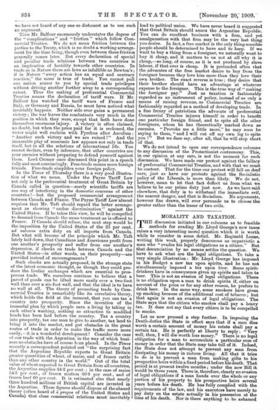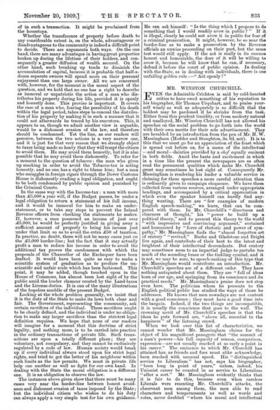MORALITY AND TAXATION.
discussion initiated in our columns as to feasible methods for evading Mr. Lloyd George's new taxes raises a very interesting moral question which it is worth while to consider in some detail. Mr. Reginald Lucas, writing this week, properly denounces as unpatriotic a. man who "evades his legal obligations as a citizen." But that denunciation by no means settles the question. We have to ask what are the legal obligations. To take a very simple illustration : Mr. Lloyd George has imposed in his Budget a new tax upon spirits, and he has not simultaneously imposed a tax upon beer. Some spirit- drinkers have in consequence given up spirits and taken to beer. This is not an evasion of legal obligations. There is no obligation upon a man to drink spirits if, either on raises a very interesting moral question which it is worth while to consider in some detail. Mr. Reginald Lucas, writing this week, properly denounces as unpatriotic a. man who "evades his legal obligations as a citizen." But that denunciation by no means settles the question. We have to ask what are the legal obligations. To take a very simple illustration : Mr. Lloyd George has imposed in his Budget a new tax upon spirits, and he has not simultaneously imposed a tax upon beer. Some spirit- drinkers have in consequence given up spirits and taken to beer. This is not an evasion of legal obligations. There is no obligation upon a man to drink spirits if, either on account of the price or for any other reason, he prefers to drink beer. In the same way, some smokers have given up smoking because of the additional cost of tobacco ; but that again is not an evasion of legal obligations. The State says that the citizen who smokes shall pay a heavy tax. It does not say that every citizen is to be compelled to smoke.
Let us now proceed a step further. In imposing the Death-duties the State in effect says that if a man dies worth a, certain amount of money his estate shall pay a certain tax. He is perfectly at liberty to reply "Very well, then, I will die worth less money. There is no legal obligation for a man to accumulate a, particular sum of money in order that the State may take toll of it. Indeed, the State does not attempt to ,prevent any man from dissipating his money in riotous laving. All that it tries to do is to prevent a man from making gifts to his prospective heirs within a fixed period before his death. That period is at present twelve months ; under the new Bill it would be three yearn. There is, therefore, clearly no evasion of legal obligations if a man hands over the whole or any portion of his property to his prospective heirs several years before his death. He has fully complied with the requirements of the law, and his executors have merely to pay duty on the estate actually in his possession at the time of his death. Nor is there anything to be ashamed of in such a transaction. It might be proclaimed from the housetops. Whether the transference of property before death to any considerable extent is, on the whole, advantageous or disadvantageous to the community is indeed a difficult point to decide. There are arguments both ways. On the one hand, there are many advantages in having great properties broken up during the lifetime of their holders, and con- sequently a greater diffusion of wealth secured. On the other hand, such breaking up tends to diminish the accumulation of capital, because it is probable that half-a- dozen separate owners will spend more on their personal enjoyment than one large owner. All we are concerned with, however, for the moment is the moral aspect of the question, and we hold that no one has a right to describe as immoral or unpatriotic the action of a man who dis- tributes his property during his life, provided it is openly and honestly done. This proviso is important. It covers the case of a man who, fearing the possibility of his death within the legal period, takes steps to conceal the distribu- tion of his property by making it in such a manner that it could not afterwards be traced by his executors. This, it appears to us, though we admit another view is arguable, would be a dishonest evasion of the law, and therefore should be condemned. Yet the line, as our readers will perceive, between the two actions is a very narrow one, and it is just for that very reason that we strongly object to taxes being made so heavy that they will tempt the citizen to avoid them. He may avoid them honestly, but it is also possible that he may avoid them dishonestly. To refer for a moment to the question of tobacco : the man who gives up smoking in order to avoid the Tobacco-tax is acting honestly, and no one has a right to blame him; but a man who smuggles in foreign cigars through the Dover Customs House is dishonestly evading a legal obligation, and ought to be both condemned by public opinion and punished by the Criminal Courts.
In the same way with the Income-tax : a man with more than £.5,000 a year will, if the Budget passes, be under a legal obligation to return a statement of his full income, and it would, be immoral for him to make an under- statement, or to take any steps to prevent the Inland Revenue officers from checking the statements he makes. If, however, a man possessed an income of just over .25,000, he would be perfectly justified in giving away a sufficient amount of property to bring his income just under that limit so as to avoid the extra £50 of taxation. In practice, no doubt, there will not be many cases just on the £5,000 border-line; but the fact that it may actually profit a man to reduce his income in order to avoid the additional tax proves the carelessness with which the proposals of the Chancellor of the Exchequer have been drafted. It would have been quite as easy to make a scientific system of graduation as to produce the un- scientific and unfair scale which has been fashioned. This point, it may be added, though touched upon in the House of Commons, has almost been lost sight of by the public amid the louder clamour created by the Land-taxes and the License-duties. It is one of the many illustrations of the hopeless muddle of the present Budget. Looking at the whole problem generally, we insist that it is the duty of the State to make its laws both clear and fair. The Government, representing the community, ask certain sacrifices of the individual. These sacrifices ought to be clearly defined, and the individual is under no obliga- tion to make any larger sacrifices than the strictest legal definition requires. We hope that none of our readers will imagine for a moment that this doctrine of strict legality, and nothing more, is to be carried into practice in the ordinary transactions of private life. Such trans- actions are upon a totally different plane ; they are voluntary, not compulsory, and they cannot be exclusively regulated by a code of law. Human society would break up if every individual always stood upon his strict legal rights, and tried to get the better of his neighbour within such limits as the law permits. We must in private life help one another as well as fight for our own hand. In dealing with the State the moral obligation is a different one. It is an obligation to observe the law.
The instances above given show that there must be many cases very near the border-line between honest avoid- ance and dishonest evasion of taxes imposed by the State; but the individual citizen who wishes to do his duty can always apply a very simple test for his own guidance. ,votes, never doubted "where his moral and. intellectual He can ask himself: "Is the thing which I propose to do something that I would readily avow in public ? " If it is illegal, clearly he could not avow it in public for fear of a criminal prosecution. It might, however, be so near the border-line as to make a prosecution by the Revenue officials an unwise proceeding on their part, but the same test would still apply. If the act is really in its essence honest and honourable, the doer of it will be willing to avow it, because he will know that he can, if necessary, defend it before the court of public opinion. In dealing with the State, as in dealing with individuals, there is one unfailing golden rule :—" Act openly !"

























































 Previous page
Previous page